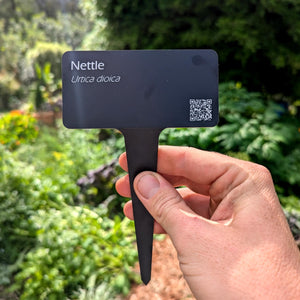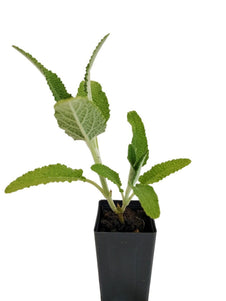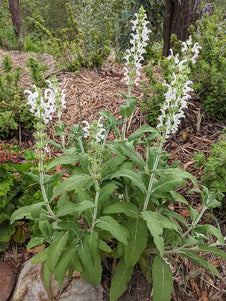











Salvia radula
Salvia radula

- In stock, ready to ship
- Inventory on the way

Usually available: All year
Life cycle: Perennial
Height: 1m
Position: Sun / part shade
Soil preference: Well drained
This is how we pack and send your Herb Plants to all states except TAS & WA
Botanical Name: Salvia radula
Salvia radula is an herbaceous perennial with a variable growth habit, depending on the climate zone. It may reach 1 meter by 1 meter, but is often smaller in regions not closely representing its natural habitat. The plant is well branched and has erect stems covered in narrowly ovate to lanceolate leaves. They are white and woolly underneath and mid-greyish green on the surface, which is covered in a ‘dotty’ texture. The stems and bracts are also green, with a delicate covering of hair. The foliage is aromatic and is a nice addition to the garden. The white flowers are luminescent and have an elegant swan-like appearance, with the hooded top gracefully curving out over the lower lobes. The inflorescences are held above the main plant.
Salvia radula is also called Scrappy African Sage and is native to the botanically rich mountain regions of South Africa and grows at elevations from 1300 to 1900 meters. It is closely related to Salvia disermas, also South African salvia with white flowers. However, Scrappy African Sage is considered to be the superior garden plant. The species name ‘radula’ refers to the roughness of the hairy leaves and the ‘Scrappy’ also describes the rough, drought tolerant foliage. However, the plant itself does not look raggedy or anything like it belongs on the scrap heap!
This plant is not well known, but is considered highly desirable for its aromatic foliage and ornamental blooms. In the past, this plant was known to be of medicinal value to South African native people. Today, it is being investigated by medical researchers for its reputed anti-bacterial and anti-malarial properties.
The salvia family has over 900 members with an extensive history as culinary, medicinal and ornamental plants. Ornamental salvias have become collectors items, as gardeners try to find a place in their garden for each and every one. There are salvias that will suit every type of soil and climate. More information on the Salvia genus and Common Sage (Salvia officinalis) may be found on our Common Sage page.
Growing Conditions
Salvia radula is a rapidly growing shrub which does very well in Mediterranean like climate regions. This is similar to its natural habitat and generally means warm, dry summers and wet winters that do not get too cold. It is also suitable for coastal areas. Full sun to part shade, with well drained soil will generally be very acceptable to this hardy plant. It is drought tolerant, with average water needs in warm weather. This salvia produces seeds quite freely but can be propagated by cuttings.
All information provided on this website is for informational purposes only. Please seek professional advice before commencing any treatment.





